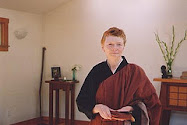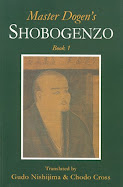 (Wandering Monk, A. Kulakov- my favorite piece, the first "real art" I ever bought.)
(Wandering Monk, A. Kulakov- my favorite piece, the first "real art" I ever bought.)This morning as I sat typing out an email-of-introduction to the next zen center I'll attend for my floating zen experiment, I had a bit of a realization concerning practice, lineage and ...maturity. For it was 19 years ago-- nineteen??!?-- that I first sat down on a pillow snatched from my couch to give zazen a try. Instructed only by Alan Watts' Way of Zen and my own intuition, I entered a doorway that opened me.
"They say there is a doorway from heart to heart, but what is the use of a door when there are no walls?" -Rumi
It's taken these years of practice to realize that all those years of practice don't mean anything; there's no advancement, no elevating epitomes, no ways-beyond. For you're always in the stream; the difference is in realizing it, or not. It's all a play of the mind, otherwise, because whatever understandings shine through, enlightenment is happening all the time.
So I was reading the Spring Hill Zen website and orienting to their philosophy, which seems to focus very specifically on the practice of sangha. And that got me to thinking about my practice of sangha: where I've sat, how I've sat, and how I've related to those sitting with me. I wondered for a moment about the senior students of this new zen center-- those who had been there many years, and how this orientation to practice has affected their way of thinking or being. And that led me to think about my own personal lineage, and how my own interaction with sangha has shaped my practice and life.
I've wandered around a lot, lived in many different states and practiced with a number of different sanghas. I always get a little sentimental when I think of those imaginary 'senior students' of any given center, wondering what it must be like to stay in one place, and practice with one sangha all the time. It's a sensibility that other military brats or gypsies in general will never know, but always wonder at; moving to another town and meeting a new friend who has always lived in the same house on the same street in the same town for the whole of their lives, it feels extraordinary and a little surreal.
But there too I think of the first sangha I ever joined, as in made myself an active and intentional part of, and I am ever grateful that I left: because for all its instability, paradoxically this bouncing-around has given me a maturity I don't know I would have gained otherwise.
I entered my first sangha with wide eyes, a shy demeanor and awfully high expectations. I think that like many, when I first set out on this path I assumed such places to be a kind of shangri-la, some oasis of good intentions and disciplined, loving, selfless interactions. In other words, perfect. Enlightened, even. And decidedly not human.
I've been reading a lot lately on other blogs about the branding of zen, the expectations of sangha and even the non-existence of "real" zen in the West. Again and again I encounter that same seed of first hope that I carried so closely to my heart, this expectation of what Zen Is, like some bubble I did not want chance to pop; and again and again, I'm reminded of the sangha that split itself in two from its clash of philosophical orientations... Or the sangha that shunned me, for not sharing its beliefs... Or the teacher I left, when I discovered how human he was.
My own path is filled with so many splits and wild encounters, and I'm willing to guess that yours is not so dissimilar. But the gift I came to appreciate today was the maturing mind birthed by all those splits and fissures: to look at last at a web-site, and think not of the shangri-la that will somehow save me, but simply of the group of people I'll chance to meet and grow with, bit-by-bit.
What is real sangha, but all that we relate to? Even if we exclude, we're still relating... And there's the trick of it!









No comments:
Post a Comment